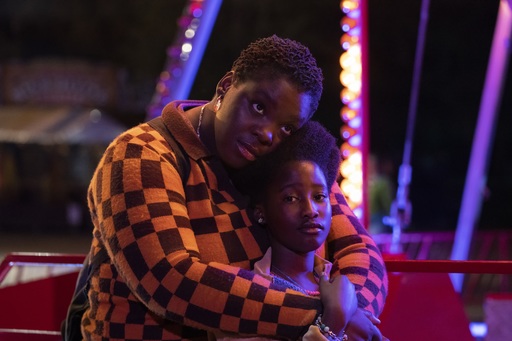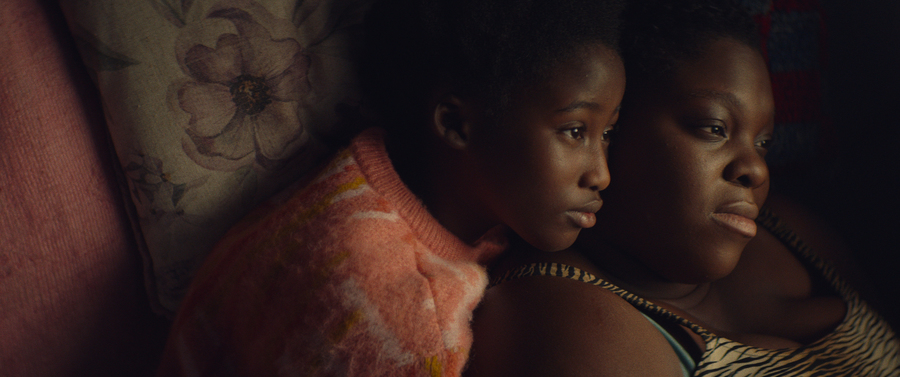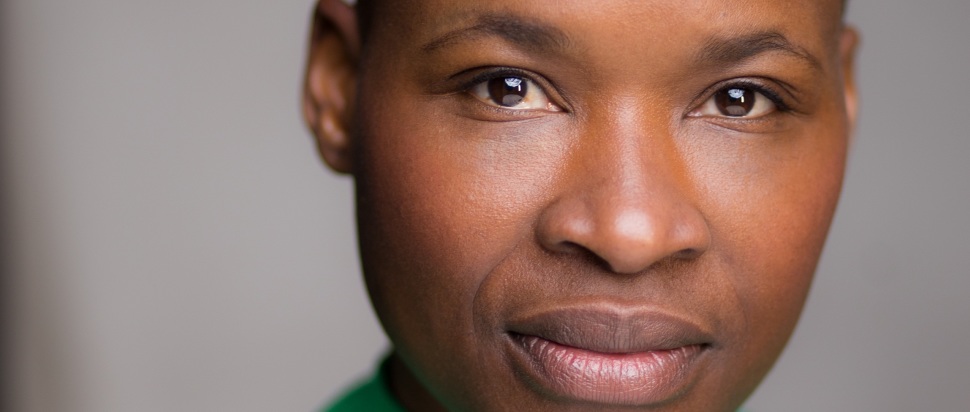Scotland on Screen: Adura Onashile on Girl
Fresh from Sundance, Adura Onashile's tender drama Girl gets a hometown premiere at Glasgow Film Festival. Onashile tells us about the film's inspiration
“Honestly, I was like, ‘How did we get Sundance?’” We’re speaking to Adura Onashile six days before the world premiere of her debut feature, Girl, at one of the world’s most prestigious film events – the festival that’s launched countless film careers, from Quentin Tarantino to Chloé Zhao. But this isn’t false modesty. Onashile genuinely seems to have lost all objectivity. “You're so close to the film, right?” she says. “You've been making it for a long time. All I can see when I watch the film is all the things that are wrong with it; all the things that I didn't achieve. And I can't quite see what works about it.” Onashile needn't have worried. Judging by the early glowing reviews, critics and audiences have been able to see plenty that works.
Girl centres on the fiercely intimate bond between 24-year-old Grace, a nervy immigrant who’s yet to embrace her new home of Glasgow, and her ten-year-old daughter Ama, who spends her evenings peering at her neighbours in the opposite flats like she’s a pint-sized Jimmy Stewart in Rear Window. The idea to explore an intense mother-daughter relationship had been percolating with Onashile for a while. “I grew up in a one-parent family, and I'm an only child,” she explains. “And I was interested in the blurred nature of my relationship with my mum. We were like best friends, and that sometimes made it difficult to get into the mother-daughter roles. I knew that I wanted to explore that.”
It was only in hindsight, though, that she could pinpoint Girl's story’s exact genesis: a period of her childhood, when she was around 11, where she and her mother were forced to stay indoors due to the activities of the National Front in their neighbourhood in Bermondsey, southeast London. “As a Black mother and child, we weren't really free to roam on the estate in the way that we wanted,” she recalls. “Until the council found us somewhere else to live, we were kind of locked in our flat and escorted to and from school.” It was a distressing period of her life, but she was also having a brilliant time. “I had 100% of my mother's attention and she created all this joy and play at home. So I guess, somewhere in me, there's always been this thing of trauma or traumatic situations, sitting tightly next to really beautiful situations.”

Déborah Lukumuena and Le’Shantey Bonsu in Adura Onashile's Girl. Still courtesy of Barry Crerar
Trauma and beauty, fear and love, are similarly intertwined in Girl. The flats in which Grace and Ama have ensconced themselves are dilapidated and dangerous – at one point a fire breaks out in the opposite building and eagle-eyed Ama raises the alarm to prevent a Grenfell-like disaster. Grace, meanwhile, appears petrified every time she steps outside their door to walk to her job as a night cleaner at the nearby St. Enoch Centre. But Grace’s feelings of trepidation about her new home aren’t reflected in Onashile and director of photography Tasha Back’s images. Instead, Grace and Ama’s home is filmed like it’s a wonderland, with overhead shots, dreamy pans and tender close-ups painting a picture of domestic bliss.
It’s a refreshing break from the clichés of British cinema, which tend to paint working-class life in shades of misery. That certainly wasn’t Onashile's experience growing up. “Yeah, we didn't have much money,” she says. “Yeah, there were traumatic social circumstances, but it wasn't all grim. It was actually really beautiful.” Onashile puts this beauty down to the reason she became a creative person in the first place. “My mother filled my imagination from a really young age and she never had a problem with me wanting to pursue this career. There was never a question of, like, Why would you want to do that?”

Le’Shantey Bonsu and Déborah Lukumuena in Girl. Still courtesy of Barry Crerar
That decision has certainly paid off for Onashile so far. As well as being a celebrated stage actor (click here to read Young Fathers' Alloysious Massaquoi raving about her performance as Medea at last year's Edinburgh International Festival), her career as a writer and director has included the immersive walking tour Ghosts, which explored Glasgow’s connection to the slave trade, and the much-celebrated Expensive Shit, which was one of the buzziest shows of the 2016 Fringe. It was seeing the latter that lead the producers of Girl, Ciara Barry and Rosie Crerar aka barry crerar, to approach Onashile and convince her to make the move from stage to screen.
“Rosie and Ciara got in touch and said, ‘I really like the way you write,' and, ‘we think you might be able to write for film.’ And I was like, ‘Oh, really?’” Making movies was never in Onashile’s plan. She loved film, but never imagined making one. “For me, film was still magic, you know? But I'll give it a go because I will give anything a go. That's been my attitude towards all of my career: try things out, take risks, put yourself in uncomfortable positions. Sometimes great things come out of this, sometimes you're burnt, but that's the risk you take. So I heeded their call.”
Our February issue is a Young Fathers takeover – there's an in-depth interview with the band; Alloysious, Kayus and G share some of their inspirations; Young Fathers collaborator Callum Easter fills out this month’s Q+A; the band’s former manager Tim London reflects on their career so far, plus a YF-approved feature on Singeli, the new sound of the Tanzanian underground music scene.
Girl opens the Glasgow Film Festival on 1 Mar, with a second screening on 2 Mar
Adura Onashile: selected biography
Film: Girl (2023), Expensive Shit (2020)
Theatre: Ghosts (2021), Expensive Shit (2016)
i: instagram.com/onashileadura
